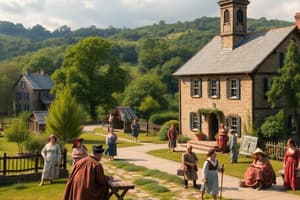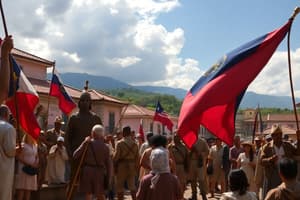Podcast
Questions and Answers
What was a significant concern of the Anti-Federalists regarding the 1787 Constitution?
What was a significant concern of the Anti-Federalists regarding the 1787 Constitution?
- It concentrated too much power in a central government. (correct)
- It established a strong national military.
- It would improve relations with Native Americans.
- It allowed for universal voting rights.
Who were the 'War Hawks' and what was their primary concern?
Who were the 'War Hawks' and what was their primary concern?
- Federalists who sought to limit military expenditures.
- Farmers advocating for peace with Britain.
- Pro-war members of Congress angered by British actions. (correct)
- Anti-war Congress members who opposed military action.
What was the main goal of Alexander Hamilton's financial report in 1790?
What was the main goal of Alexander Hamilton's financial report in 1790?
- To establish the creditworthiness of the U.S. (correct)
- To promote international trade agreements.
- To redistribute wealth among states.
- To eliminate all national debts.
What was the main purpose of the Mayflower Compact?
What was the main purpose of the Mayflower Compact?
What was one of the major consequences of the War of 1812?
What was one of the major consequences of the War of 1812?
Which act, passed in 1765, angered many American colonists due to its requirement for a stamp on all printed items?
Which act, passed in 1765, angered many American colonists due to its requirement for a stamp on all printed items?
Which war was characterized by conflicts between the U.S. and Great Britain and also involved the invasion of Canada?
Which war was characterized by conflicts between the U.S. and Great Britain and also involved the invasion of Canada?
What was the main aim of the Sugar Act introduced in 1764?
What was the main aim of the Sugar Act introduced in 1764?
What was Thomas Paine's contribution to the American Revolution?
What was Thomas Paine's contribution to the American Revolution?
During the Quasi War, what significant action did President John Adams take?
During the Quasi War, what significant action did President John Adams take?
What were the Intolerable Acts mainly instigated by?
What were the Intolerable Acts mainly instigated by?
What economic shift did the Market Revolution represent in the 19th century?
What economic shift did the Market Revolution represent in the 19th century?
Which significant document laid out the foundation of American government and outlined the grievances against King George III?
Which significant document laid out the foundation of American government and outlined the grievances against King George III?
Which group was known for their demands for protections of individual rights?
Which group was known for their demands for protections of individual rights?
What event escalated tensions leading to the Boston Massacre?
What event escalated tensions leading to the Boston Massacre?
Where did the first major battle of the American Revolution take place?
Where did the first major battle of the American Revolution take place?
What was the significance of the Battle of Saratoga in the American Revolution?
What was the significance of the Battle of Saratoga in the American Revolution?
Which major issue was highlighted by the weaknesses of the Articles of Confederation?
Which major issue was highlighted by the weaknesses of the Articles of Confederation?
What was the outcome of the Battle at Yorktown?
What was the outcome of the Battle at Yorktown?
What did the Paxton Boys achieve through their actions?
What did the Paxton Boys achieve through their actions?
What was the primary goal of the Sons and Daughters of Liberty?
What was the primary goal of the Sons and Daughters of Liberty?
What was a primary purpose of the Land Law of 1796?
What was a primary purpose of the Land Law of 1796?
What significant event is referred to as the 'shot heard round the world'?
What significant event is referred to as the 'shot heard round the world'?
Who led the Corps of Discovery Expedition?
Who led the Corps of Discovery Expedition?
What was one consequence of the British victory at Bunker Hill?
What was one consequence of the British victory at Bunker Hill?
What were Benjamin Franklin's 13 laws intended to represent?
What were Benjamin Franklin's 13 laws intended to represent?
What was a main feature of the Articles of Confederation?
What was a main feature of the Articles of Confederation?
What inspired the concept of Republicanism as understood during the American Revolution?
What inspired the concept of Republicanism as understood during the American Revolution?
What motivated Shay's Rebellion in the 1780s?
What motivated Shay's Rebellion in the 1780s?
What was the outcome of Washington's crossing of the Delaware River?
What was the outcome of Washington's crossing of the Delaware River?
Which group played a significant role in the non-importation act during the American Revolution?
Which group played a significant role in the non-importation act during the American Revolution?
What was the purpose of the 1830 Indian Removal Act?
What was the purpose of the 1830 Indian Removal Act?
What does the slogan 'Fifty-four forty or Fight' represent?
What does the slogan 'Fifty-four forty or Fight' represent?
What was the main strategy behind the British troops' advance during Lexington and Concord?
What was the main strategy behind the British troops' advance during Lexington and Concord?
What major consequence did the Mexican-American War have?
What major consequence did the Mexican-American War have?
What was the ruling of the Supreme Court in the 1857 case concerning citizenship of African Americans?
What was the ruling of the Supreme Court in the 1857 case concerning citizenship of African Americans?
What was the 'Trail of Tears' associated with?
What was the 'Trail of Tears' associated with?
What belief was the concept of Manifest Destiny associated with?
What belief was the concept of Manifest Destiny associated with?
Which president was associated with the slogan 'Fifty-four forty or Fight'?
Which president was associated with the slogan 'Fifty-four forty or Fight'?
What was a result of the Mexican-American War concerning territorial changes?
What was a result of the Mexican-American War concerning territorial changes?
What was the primary focus of the Compromise of 1850?
What was the primary focus of the Compromise of 1850?
What was a key difference between Abraham Lincoln and Stephen Douglas regarding slavery?
What was a key difference between Abraham Lincoln and Stephen Douglas regarding slavery?
What significant event was triggered by the election of 1860?
What significant event was triggered by the election of 1860?
What event is associated with John Brown during the 1850s?
What event is associated with John Brown during the 1850s?
The Dred Scott decision is most notable for addressing which theme?
The Dred Scott decision is most notable for addressing which theme?
What was the purpose of the Gettysburg Address?
What was the purpose of the Gettysburg Address?
What role did the Fugitive Slave Act play in American history?
What role did the Fugitive Slave Act play in American history?
Which general led Confederate forces at the pivotal Battle of Gettysburg?
Which general led Confederate forces at the pivotal Battle of Gettysburg?
Flashcards
Mayflower Compact
Mayflower Compact
A document signed by 41 men on the Mayflower, establishing self-governance for the new colony.
Stamp Act
Stamp Act
A 1765 British law requiring a stamp on all printed materials, angering the American colonists.
Sugar Act
Sugar Act
A 1764 British law imposing new taxes on sugar and molasses, increasing trade restrictions.
Common Sense
Common Sense
Signup and view all the flashcards
Declaration of Independence
Declaration of Independence
Signup and view all the flashcards
Boston Massacre
Boston Massacre
Signup and view all the flashcards
Intolerable Acts
Intolerable Acts
Signup and view all the flashcards
Tea Act
Tea Act
Signup and view all the flashcards
Bunker Hill Battle
Bunker Hill Battle
Signup and view all the flashcards
Sons and Daughters of Liberty
Sons and Daughters of Liberty
Signup and view all the flashcards
Lexington and Concord
Lexington and Concord
Signup and view all the flashcards
Republicanism
Republicanism
Signup and view all the flashcards
Washington's Crossing
Washington's Crossing
Signup and view all the flashcards
Shay's Rebellion
Shay's Rebellion
Signup and view all the flashcards
American Revolution
American Revolution
Signup and view all the flashcards
High ground
High ground
Signup and view all the flashcards
Battle of Saratoga
Battle of Saratoga
Signup and view all the flashcards
Battle of Yorktown
Battle of Yorktown
Signup and view all the flashcards
Articles of Confederation
Articles of Confederation
Signup and view all the flashcards
Paxton Boys
Paxton Boys
Signup and view all the flashcards
Land Law of 1796
Land Law of 1796
Signup and view all the flashcards
Corps of Discovery Expedition
Corps of Discovery Expedition
Signup and view all the flashcards
Benjamin Franklin's 13 Laws
Benjamin Franklin's 13 Laws
Signup and view all the flashcards
Federalists
Federalists
Signup and view all the flashcards
Anti-Federalists
Anti-Federalists
Signup and view all the flashcards
War Hawks
War Hawks
Signup and view all the flashcards
War of 1812
War of 1812
Signup and view all the flashcards
Market Revolution
Market Revolution
Signup and view all the flashcards
Quasi War
Quasi War
Signup and view all the flashcards
Democratic-Republicans
Democratic-Republicans
Signup and view all the flashcards
Hamilton's Report
Hamilton's Report
Signup and view all the flashcards
Indian Removal
Indian Removal
Signup and view all the flashcards
"Fifty-four Forty or Fight"
"Fifty-four Forty or Fight"
Signup and view all the flashcards
Mexican-American War
Mexican-American War
Signup and view all the flashcards
Treaty of Guadalupe Hidalgo
Treaty of Guadalupe Hidalgo
Signup and view all the flashcards
Manifest Destiny
Manifest Destiny
Signup and view all the flashcards
Trail of Tears
Trail of Tears
Signup and view all the flashcards
Dred Scott v. Sandford
Dred Scott v. Sandford
Signup and view all the flashcards
Lincoln-Douglas Debates
Lincoln-Douglas Debates
Signup and view all the flashcards
Compromise of 1850
Compromise of 1850
Signup and view all the flashcards
John Brown
John Brown
Signup and view all the flashcards
Dred Scott Case
Dred Scott Case
Signup and view all the flashcards
Election of 1860
Election of 1860
Signup and view all the flashcards
Lincoln's views on slavery
Lincoln's views on slavery
Signup and view all the flashcards
Emancipation Proclamation
Emancipation Proclamation
Signup and view all the flashcards
Gettysburg Address
Gettysburg Address
Signup and view all the flashcards
Turning Point of Civil War
Turning Point of Civil War
Signup and view all the flashcards
Study Notes
Treaty of Tordesillas
- Divided the new world into spheres of influence between Spain and Portugal.
Jamestown Colony
- First permanent English colony in America.
- Primarily sought gold and silver.
- Experienced early failures.
Plymouth Colony
- Founded by Puritans seeking religious freedom.
- Separated from the Church of England.
Massachusetts Bay Colony
- Larger Puritan settlement.
- Led by John Winthrop.
- Established the "City Upon a Hill" ideal.
John Winthrop
- Leader of the Massachusetts Bay Colony.
- Promoted religious conformity.
- Famous for "City Upon a Hill" sermon.
Mayflower Compact
- Document signed by colonists on the Mayflower.
- Established self-governance.
7 Years' War (French and Indian War)
- Conflict between Great Britain and France over territory in North America.
Enlightenment
- Intellectual movement emphasizing reason, science, and observation.
- Influenced revolutionary ideas.
- Key figures included Locke and Voltaire.
First Great Awakening
- Religious revival in British America.
- Emphasized personal conversion and emotional faith.
- Prominent figures included Jonathan Edwards and George Whitefield.
Boston Tea Party
- Protest by American colonists against British taxes.
- Colonists dumped tea into Boston Harbor.
Stamp Act
- British tax on printed materials.
- Colonists opposed it as taxation without representation.
Sugar Act
- British tax on sugar and molasses.
- part of British efforts to recoup debt from the French and Indian War.
Intolerable Acts/Coercive Acts
- Punishments imposed by Britain on Massachusetts after the Boston Tea Party.
- Included the Boston Port Act, Massachusetts Government Act, Quartering Act, and the Administration of Justice Act.
Boston Massacre
- Violent confrontation between British soldiers and colonists in Boston.
- Soldiers were accused of opening fire on unarmed civilians.
Sons and Daughters of Liberty
- Groups resisting British policies.
- Used forms of pressure, protest and coercion.
Common Sense
- Pamphlet by Thomas Paine advocating for American independence.
Declaration of Independence
- Document declaring the American colonies' separation from Britain.
- Written primarily by Thomas Jefferson.
Battle of Bunker Hill
- Early American victory during the Revolutionary War.
- Demonstrated the colonists' ability to fight against British troops..
Battle of Saratoga
- Pivotal Revolutionary War victory for the Americans.
- Convinced France to formally support American independence.
Battle of Yorktown
- Final major battle of the Revolutionary War.
- British surrender to the combined American and French forces.
Articles of Confederation
- First governing document of the United States.
- Created a weak central government.
Republicanism
- Political philosophy emphasizing civic virtue, citizen participation, and public good.
- Inspired the American Revolution's ideals.
Shay's Rebellion
- Uprising of farmers against state governments.
- Highlighted the weakness of the Articles of Confederation and the need for a stronger central government.
Quasi War
- Undeclared war between the US and France.
- Involved naval skirmishes and diplomatic disputes..
War of 1812
- Conflict between US and Great Britain.
- Caused by issues like British impressment of American sailors and trade restrictions.
- Resulted in a strengthening of national pride and further westward expansion.
Market Revolution
- Transformation of the US economy during the 19th century.
- Shift from agriculture to manufacturing and trade.
- Introduction of new technologies like canals, steamboats, and railroads.
Cotton Engine (Gin)
- Invention significantly increasing cotton production.
- Contributed to the expansion of slavery in the South.
Mechanical Reaper
- Invention that automated the harvesting process.
- Increased effectiveness and efficiency of agricultural production.
Samuel Morse
- Inventor of the telegraph.
- Revolutionized communication and business.
Erie Canal
- Canal that connected the Hudson River to the Great Lakes and the Mississippi River Valley.
- Facilitated trade and transportation.
Lowell Girls
- Women who worked in textile mills in Lowell, Massachussetts.
- Experienced hard working conditions but opened the door for women work.
Manifest Destiny
- Belief that the US had a divine right to expand westward.
- Fueled westward expansion and territorial disputes.
Compromise of 1850
- Series of laws aimed at resolving issues of slavery in the United States.
Underground Railroad
- Network of secret routes and safe houses used by enslaved people to escape.
- Led by abolitionists and allies.
Fugitive Slave Act
- Part of the Compromise of 1850.
- Allowed for the capture and return of runaway enslaved people.
Kansas-Nebraska Act
- Law that allowed for popular sovereignty to determine the issue of slavery in new territories.
- Led to violence and conflict in Kansas ("Bleeding Kansas").
Dred Scott Decision
- Supreme Court ruling that enslaved people were not citizens and could not sue in court.
Lincoln-Douglas Debates
- Series of debates between Abraham Lincoln and Stephen Douglas.
- Focused on the issue of slavery and its expansion.
Election of 1860
- Abraham Lincoln's election as president sparked secession of Southern states.
- Triggered the beginning of the Civil War.
Emancipation Proclamation
- President Lincoln's declaration freeing enslaved people in Confederate states.
- Changed the focus of the Civil War.
Gettysburg Address
- Lincoln's address honoring the fallen soldiers at Gettysburg.
- Emphasized the importance of preserving the nation's ideals.
13th Amendment
- Amendment to the US Constitution abolishing slavery.
Radical Republicans
Studying That Suits You
Use AI to generate personalized quizzes and flashcards to suit your learning preferences.




